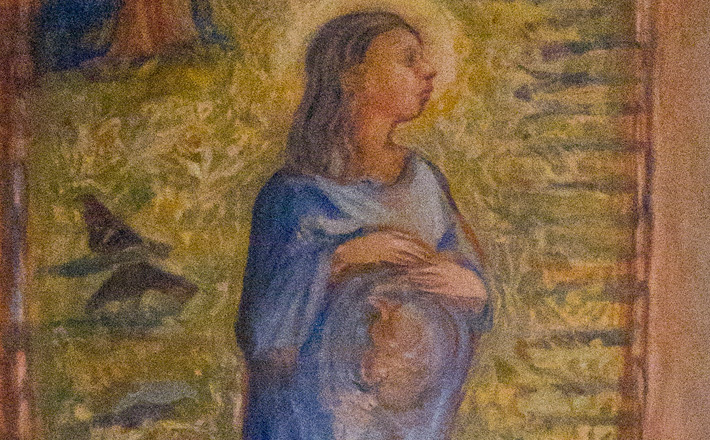Commentary on Isaiah 7:10-16
This is a very challenging chapter to interpret, much less to preach, in part because it requires that one be familiar with a number of related texts (Isaiah 7:1-9; 8:1-8; 2 Kings 16).
Given the importance of the Immanuel promise (Isaiah 7:14-17) to Christian theology, however, this text needs to be preached — with great care, discipline, and passion. If we are patient in listening to this text, we will recognize in it a God who is both comforting and disturbing, threatening and assuaging. The God of Isaiah 7 is the God we know in Jesus Christ.
Isaiah 7:10-16 is the second movement in a larger “sermon” offered by Isaiah to king Ahaz of Jerusalem. To more fully appreciate these verses, then, let us first consider the immediate literary context. Verses 1-2 set the scene:
“In the days of Ahaz son of Jotham son of Uzziah, king of Judah, King Rezin of Aram and King Pekah son of Remaliah of Israel went up to attack Jerusalem, but could not mount an attack against it. When the house of David heard that Aram had allied itself with Ephraim, the heart of Ahaz and the heart of his people shook as the trees of the forest shake before the wind” (verses 1-2).
These verses indicate that this text is set against the larger backdrop of 8th century BCE international politics. Three main actors are mentioned: the king of Judah (Ahaz), the king of Israel (Pekah), and the king of Aram (Rezin). As a reminder, the kingdoms of Judah and Israel are two segments of a formerly unified kingdom which, was divided shortly after Solomon’s death (1 Kings 12). An alliance is formed between Israel (the northern kingdom) and Aram (a non-Israelite kingdom) to attack Judah, whose capital is Jerusalem. They do this, because Judah apparently refused to participate in a coalition against the northern Mesopotamian power of Assyria, which wanted control over the region (2 Kings 16; 2 Chronicles 28).
Not surprisingly, this crisis incited terror in Ahaz and his subjects, who suddenly found themselves on the dangerous end of two enemy spears. Isaiah is called to enter into this high stakes mess. Unlike Hezekiah who trusts Isaiah’s words (Isaiah 36), however, Ahaz responds with unbelief to God and his prophet. As Christopher Seitz has shown in his excellent commentary on Isaiah, in the larger context of Isiah, Ahaz and Hezekiah are paradigms of unbelief and trust respectively.1
Isaiah’s first oracle to Ahaz contains both words and a sign. Concerning the words, Isaiah is given the following: “Take heed, be quiet, do not fear, and do not let your heart be faint because of these two smoldering stumps of firebrands, because of the fierce anger of Rezin and Aram and the son of Remaliah” (verse 4). The sign is Isaiah’s son, Shear-yashub (“A remnant shall return”), who accompanies Isaiah to his meeting with Ahaz. That a child-sign is used in conjunction with a promise is unsurprising in these early chapters of Isaiah, where children often function as signs (Isaiah 7:14; 8:1, 18). In this case, the child Shear-yashub seems to guarantee that, while Ahaz may experience some suffering, God will remain faithful to God’s people as a whole.
According to the faith-filled words of Isaiah, the attacking kings are not legitimate threats but rather are “smoldering stumps” — hot, but harmless. The Judahite king is further told that this “evil” attempt to conquer Jerusalem “shall not stand, and it shall not come to pass” (verse 7). God accentuates the urgent need to trust in these promises by issuing a threat: “If you do not stand firm in faith, you shall not stand at all” (verse 9). Isaiah’s words underscore the urgent need for the king to trust God, and the inherent danger in failing to do so. Whether Ahaz stands or falls depends entirely on trust in God’s word.
The second movement is Isaiah’s address to Ahaz beginning at verse 10. God offers yet another sign to the distressed king, only this time, one of Ahaz’s own choosing: “Ask a sign of the Lord your God; let it be deep as Sheol or high as heaven” (verse 11). The statement is stunning, for in it God makes divine power available to Ahaz in a seemingly limitless manner. Ahaz, however, refuses this opportunity (verse 12), and in the process wears down God’s patience.
Ahaz’s refusal to ask for a sign is likely also tied to his Realpolitik decision to seek protection from the Assyrian king, Tiglath-Pileser (see 2 Kings 16:7). Ahaz submits himself to the Assyrian king, saying, “I am your servant and your son. Come up, and rescue me from the hand of the king of Aram and from the hand of the king of Israel, who are attacking me.” Ahaz also took the silver and gold found in the house of the Lord and in the treasures of the king’s house, and sent a present to the king of Assyria” (2 Kings 16:7-8). From the perspective of Isaiah, Ahaz’s decision to trust in Tiglath Pilser instead of God was a grave and foolish one indeed.
In frustration, Isaiah tells Ahaz that, despite his refusal to ask for a sign, God is going to give him one anyway. Isaiah begins by addressing Ahaz according to his dynasty’s name: “O House of David!” (see 2 Samuel 7). From there, God issues a number of promises and threats.
- The “young woman” shall bear a son, “Immanuel” (“God is with us”) (verse 14).
- The child shall eat curds and honey by the time he knows how to refuse evil and choose good (verse 15).
- Moreover, before the child knows how to refuse evil and choose good, the land of Ahaz’s two enemies will be deserted (verse 16).
- God will bring upon Ahaz, his dynasty, and his people the king of Assyria.
The obstinate response of Ahaz in verse 12 results in an ambivalent series of responses from God. On the one hand, Immanuel’s birth will mean the end of Ahaz’s enemies (see Isaiah 8:1-4, for a continuation of this promise against Israel and Aram), which is clearly a boon for the Judahite king. The flipside, however, is that God will bring against Ahaz and Judah the violent power of “the king of Assyria” (see Isaiah 8:5-8 for a continuation of this threat).
In the end, the fact that Isaiah 7 is a text that both saves and condemns may be fitting, considering that it is featured in the Gospel of Matthew (Matthew 1:22-23), whose Jesus is messianic in the fullest sense of the word — saving, teaching, exorcising, forgiving, and judging. In this advent season, we would do well to remember that, the king whose return we long for, will one day come in full apocalyptic glory, as both judge and savior. At this time in the liturgical calendar, we are invited to hope, pray, and long for this revelation.
Notes:
1 Christopher R. Seitz, Isaiah 1-39 (Interpretation; Louisville: John Knox, 1993).


December 18, 2016